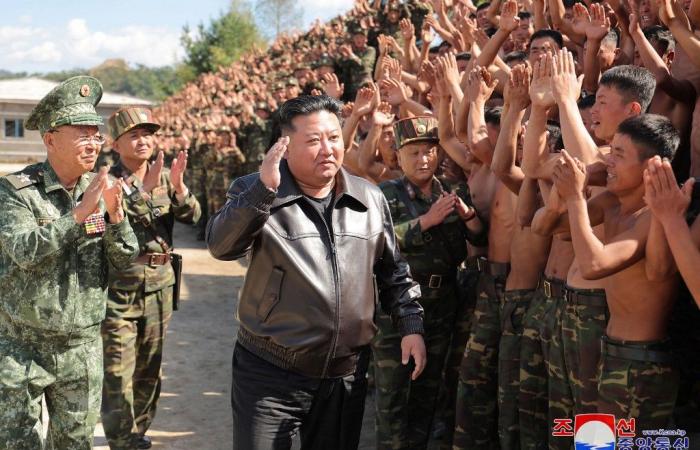Military cooperation between North Korea and Russia took a step up after around 10,000 North Korean troops were sent to Russia in late October, according to the Ukrainian government. And this initiative is far from only worrying Ukraine and its allies. For South Korea, this operation has the appearance of a “dress rehearsal” which revives the risk of escalation on the Korean peninsula. But many North Korean escapees question the apparent elitism of this army corps, which could represent more of a liability than an asset for Russia.
The North Korean Foreign Minister's visit was an opportunity to reaffirm Pyongyang's unconditional support for Russia, including “until its victory” in Ukraine. Support far from being confined to speech. Because in addition to the approximately 8 million artillery shells and rockets sent to Vladimir Putin, nearly 10,000 soldiers were sent by Kim Jong-un to the Kursk region according to NATO and the United States. The objective? Train them in combat to subsequently deploy them on the Ukrainian front.
And the army corps that was sent to Russia was not chosen at random. These are the Storm Corps, literally Storm Corps, an elite unit of North Korean special forces historically trained to infiltrate South Korea.
“Human bombs”
The symbol is strong. North Korea did not hesitate to send three of its generals to Russia, including General Kim Yong Bok, commander of the special forces and the 11th Army Corps, also known as Storm Corpsto come to the aid of its Russian ally. This elite unit, specialized in infiltration and sabotage, historically comes from former units created for and following the assassination attempt on South Korean President Park Chung-hee in Seoul on January 21, 1968. The South Korean military estimates that around 60,000 soldiers make up this unit.
READ ALSO: Meeting between Vladimir Putin and Kim Jong-un: towards an intensification of the war in Ukraine?
Their training relies on learning special military techniques like kidnapping key people and launching surprise attacks. In a report by the US Defense Intelligence Agency published in 2021 on North Korea's military power, these operations units stand out from other North Korean army corps due to their advanced equipment ( explosives, chemical and biological agents, parachutes and airplanes). Widely publicized among North Korean citizens, these soldiers are presented as soldiers of a particular caliber.
“Cannon fodder”
If the Defense Intelligence Agency reminds that these units should not be underestimated, the lack of preparation of these soldiers for modern warfare risks altering their added value alongside Russian troops and contrasts sharply with the billion dollars invested by Ukraine in drones. Enough to make these elite soldiers potential victims on the Ukrainian front.
« The primary role of the Storm Corps is rapid infiltration behind enemy lines for missions such as assassinations and installation sabotage. (…). It is unclear what their role will be in a war primarily involving missile strikes, drone warfare and electronic battles. “, explains Hyunseung Lee, a 43-year-old North Korean escapee who fled North Korea in June 2006 in an interview with Korea Daily.
In an article from Washington PostLee Woong-gil, former member of the Storm Corps (1998-2003) who fled his unit in June 2006 to take refuge in South Korea, discusses the potential losses due to the lack of training of these soldiers on real fronts of war. “ They are not trained with the best technology [ou] advanced equipment (…) If they were deployed to the battlefield where Ukrainians use advanced technologies, drones and missiles, they will never have had this experience before (…), most of them have never received adequate combat training,” explains Lee Woong-gil.
READ ALSO: kyiv and Seoul denounce the presence of North Korean soldiers in Ukraine
In a public letter addressed to Ukrainian President Volodymyr Zelensky on October 30, the veteran pleaded for the implementation of psychological warfare techniques in order to encourage desertions and save these lives “ innocent », who are mainly young recruits, some of whom are barely 20 years old. “ These men are victims of a bloody agreement between Kim Jong-un and Putin (…). Ukraine can save these young lives through psychological warfare – broadcasts, radios and messages of hope (…). Even in the Russian army, the environment is much freer than in North Korea. Young North Koreans deployed overseas are naturally exposed to the outside world and will begin to see things differently. »
Uncertainties about the “merchandise”
But this sending of troops, intrinsically risky, calls into question the very nature of the soldiers sent. For Lee Woong-gil, these are indeed special forces, but perhaps not ” best members “. Kim Young-hee, another North Korean escapee, questioned by the Korea Timesis more skeptical.
« I wonder if these are really special forces “, she said. She said the small build of the soldiers and their pale faces that appear in the leaked videos contrast sharply with her memory of the elite agents. “ They were very different from the Storm Corps members I know. Special Forces are physically fit and athletic because they are well-fed and receive specialized training. In contrast, the soldiers I saw on TV looked malnourished and resembled ordinary soldiers I met in rural North Korea. »
An observation shared by Kang Cheol-hwan, North Korean defector and former political prisoner of the Yodok concentration camp. On YouTube, the now journalist cites testimonies from informants in the North who corroborate Kim Young-hee's statements. “ North Korean troops sent to Russia are not members of the elite army “, he says. “Kim Jong-un would be better off sending inexperienced soldiers to the front, because they will likely become cannon fodder. The more North Koreans die on the battlefield, the more likely it is to make money from Russia “. An example which sadly illustrates the “ ruthless business strategy » which Kim Jong-un has been engaging in for more than two years in Ukraine.
READ ALSO: Israel, Saudi Arabia, North Korea… These countries which see Trump's return to power as a godsend
The Ukrainian front, a lucrative business for Kim Jong-un
Sending soldiers to Russia does indeed have advantages for Kim Jong-un. On the one hand, substantial financial gains, on the other hand, combat training which until now was sorely lacking.
According to a recent study by the Friedrich-Naumann Foundation published on Monday, North Korean arms deliveries since the start of the military invasion of Ukraine are estimated at between 1.7 and 5.5 billion US dollars. By comparison, the entire North Korean economy is valued by the Seoul Central Bank at just US$23 billion. And the North Korean regime's financial gains are not limited to sending war materials. According to South Korea's National Intelligence Service, the regime receives more than 90% of the income paid by Russia to Kim Jong-un's soldiers. On a salary of $2,000, the real net income of North Korean fighters would be only $200.
A sum sufficient to encourage many young soldiers to volunteer to join Russia. The government also offers to reward them with Party membership and the possibility of settling in the North Korean capital. A holy grail for a population that still needs government approval to move from one province of the country to another.






